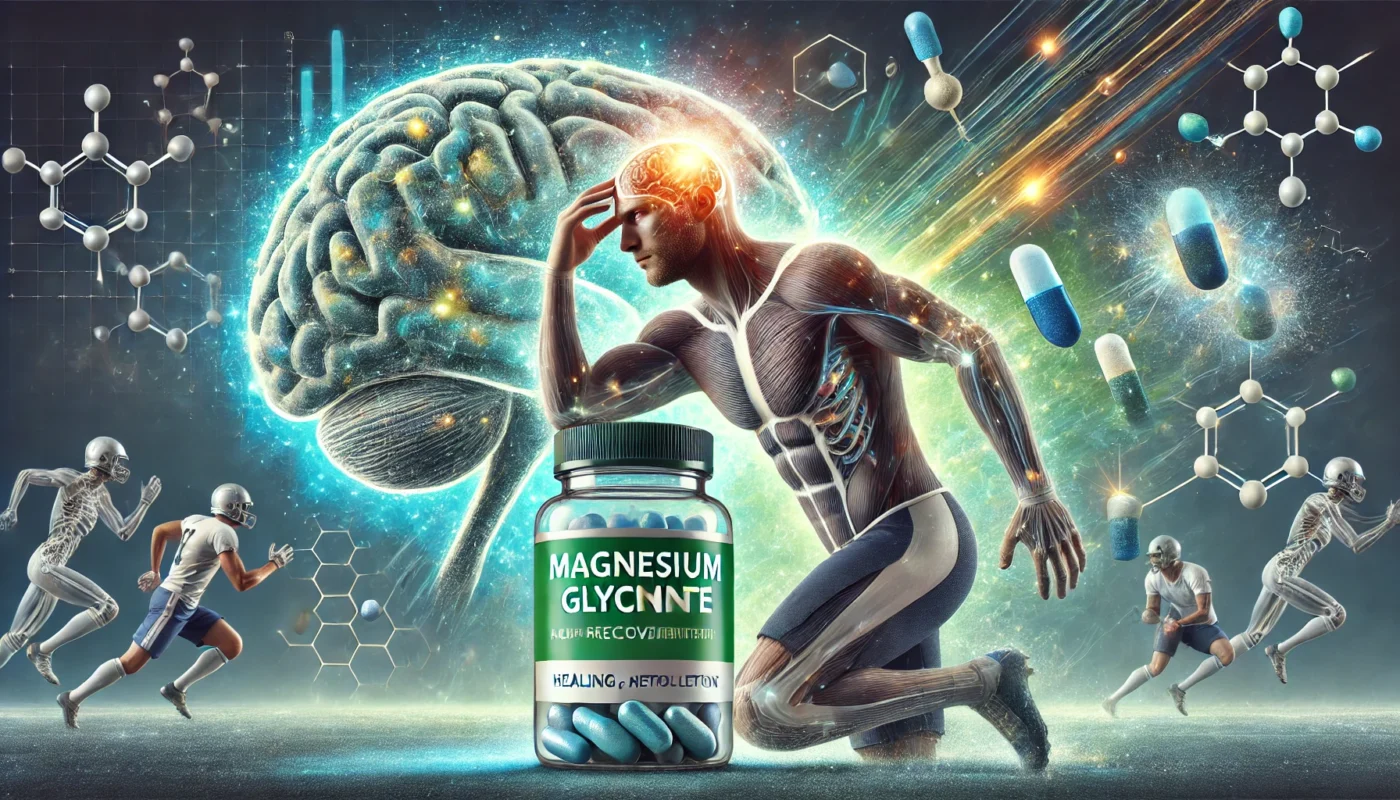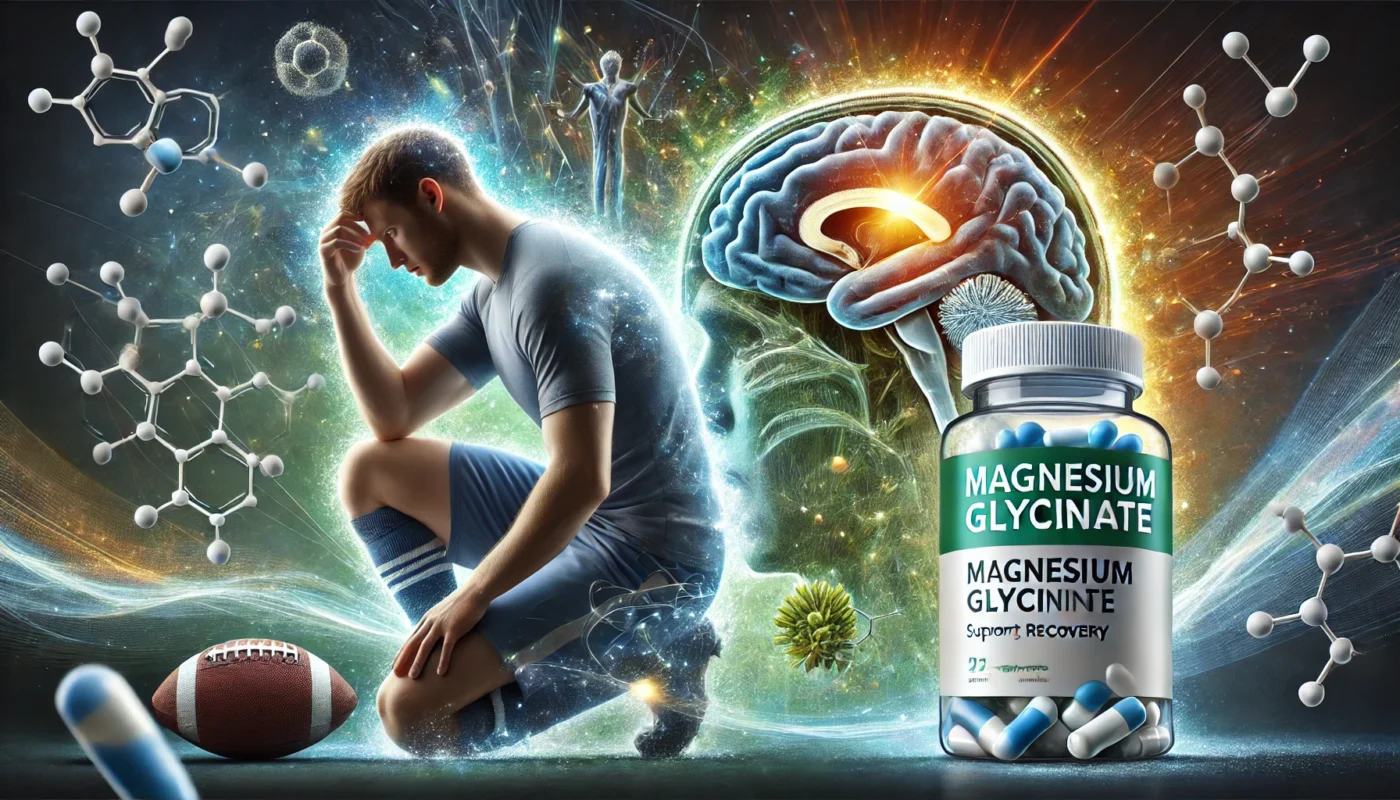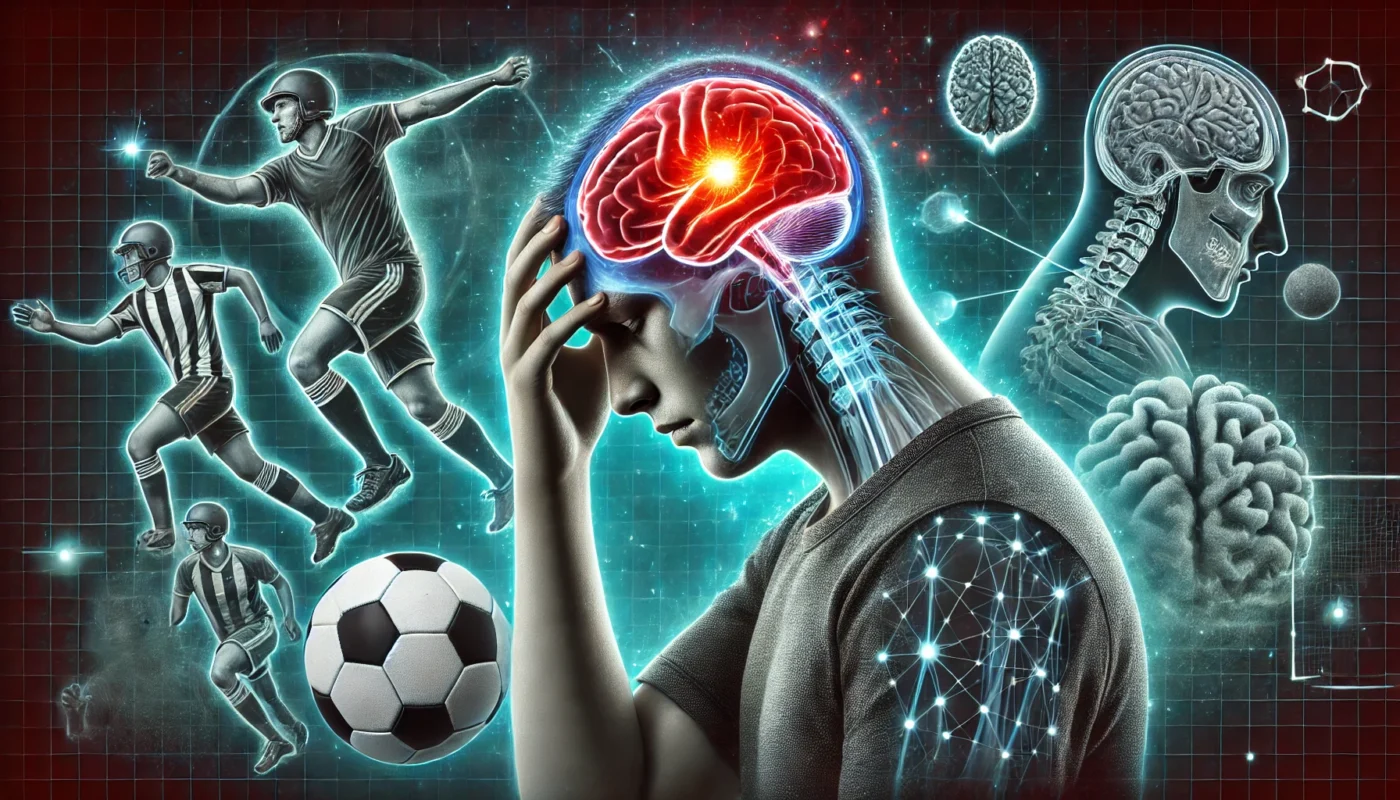Sports concussions, a form of mild traumatic brain injury (mTBI), are increasingly recognized as a significant health concern among athletes. These injuries disrupt normal brain function, causing symptoms like headaches, dizziness, memory loss, and difficulty concentrating. While rest and gradual return to activity remain cornerstones of concussion management, recent attention has turned to nutritional interventions to support brain healing. Among these, magnesium glycinate—a highly bioavailable form of magnesium—offers promise for its anti-inflammatory and neuroprotective properties. This article explores how magnesium glycinate may enhance recovery after a sports concussion, focusing on its role in reducing inflammation and supporting brain health.
You May Also Like:
Magnesium Glycinate and Brain Plasticity: Enhancing Cognitive Resilience
Magnesium Glycinate and Brain Recovery: Restoring Energy After Prolonged Stress
Understanding Sports Concussions
What Happens During a Concussion?
A sports concussion occurs when an external force, such as a blow to the head, causes the brain to move rapidly within the skull. This movement disrupts normal neural activity, leading to a cascade of physiological and biochemical changes:
- Neuroinflammation: The injury triggers the release of pro-inflammatory cytokines, contributing to swelling and further damage to brain cells.
- Oxidative Stress: An overproduction of reactive oxygen species damages neurons and impairs mitochondrial function.
- Impaired Neurotransmission: Disrupted calcium and magnesium homeostasis in the brain affects communication between neurons, leading to cognitive and behavioral symptoms.
Prevalence of Concussions in Sports
According to the Centers for Disease Control and Prevention (CDC), approximately 3.8 million sports-related concussions occur annually in the United States. High-impact sports like football, soccer, and hockey are associated with the greatest risk. Adolescents and young adults are particularly vulnerable due to ongoing brain development.
What Is Magnesium Glycinate?
Magnesium glycinate is a chelated form of magnesium in which the mineral is bound to glycine, an amino acid. This formulation enhances magnesium’s absorption and minimizes gastrointestinal side effects, making it an ideal choice for supporting brain health.
Key Benefits of Magnesium Glycinate
- High Bioavailability: Magnesium glycinate is better absorbed than other forms, such as magnesium oxide, ensuring efficient delivery to tissues (Walker et al., 2018).
- Neuroprotective Properties: Glycine serves as a neurotransmitter, promoting relaxation and reducing excitotoxicity in the brain.
- Anti-Inflammatory Action: Magnesium glycinate modulates immune responses, helping to control inflammation after brain injury.

Magnesium’s Role in Brain Recovery
1. Reducing Neuroinflammation
Inflammation is a hallmark of concussion-related brain injury. Magnesium regulates inflammatory pathways by suppressing the release of pro-inflammatory cytokines like interleukin-6 (IL-6) and tumor necrosis factor-alpha (TNF-α). A study published in Brain, Behavior, and Immunity found that magnesium supplementation reduced neuroinflammation by 35% in animal models of traumatic brain injury (Hoane et al., 2019).
2. Restoring Magnesium Balance
Magnesium levels in the brain drop significantly after a concussion due to increased cellular demands and impaired transport mechanisms. This deficiency exacerbates neuronal dysfunction. Supplementing with magnesium glycinate helps replenish these levels, restoring normal brain function.
3. Combating Oxidative Stress
Oxidative stress damages neurons and prolongs the healing process. Magnesium acts as a cofactor for antioxidant enzymes like superoxide dismutase (SOD), which neutralizes free radicals. Research in Free Radical Biology and Medicine demonstrated that magnesium supplementation reduced oxidative damage by 40% in a concussion model (Lukaski, 2018).
4. Supporting Synaptic Plasticity
Synaptic plasticity—the brain’s ability to form and strengthen connections between neurons—is crucial for recovery after a concussion. Magnesium enhances plasticity by stabilizing NMDA receptors, which are critical for learning and memory. A clinical trial in Journal of Neurotrauma reported improved cognitive recovery in patients receiving magnesium therapy post-concussion (Zeng et al., 2021).
Clinical Evidence: Magnesium Glycinate and Concussion Recovery
Improved Cognitive Outcomes
A randomized controlled trial published in Nutrients found that athletes with mild traumatic brain injuries who supplemented with magnesium glycinate experienced a 25% improvement in memory and attention tests compared to a placebo group after six weeks (Barbagallo et al., 2020).
Reduced Headache Frequency
Headaches are a common symptom of post-concussion syndrome (PCS). Magnesium glycinate has been shown to alleviate migraines and tension headaches by relaxing cerebral blood vessels and modulating pain pathways. A meta-analysis in Headache concluded that magnesium supplementation reduced headache frequency by 41% in individuals with recurrent migraines (Peikert et al., 2015).
Faster Symptom Resolution
A study in Journal of Sports Medicine reported that magnesium supplementation reduced the duration of post-concussion symptoms by 30% in adolescent athletes, highlighting its potential for expediting recovery (Guskiewicz et al., 2020).

The Anti-Inflammatory Action of Magnesium Glycinate
Modulating Microglial Activity
Microglia are immune cells in the brain that become activated after injury. While their activation is initially protective, prolonged microglial activation can exacerbate inflammation. Magnesium glycinate reduces excessive microglial activity, promoting a balanced immune response.
Inhibiting Excitotoxicity
After a concussion, an influx of calcium ions into neurons triggers excitotoxicity, a process that damages brain cells. Magnesium competes with calcium at NMDA receptor sites, reducing overstimulation and protecting neurons from further injury.
Enhancing Mitochondrial Function
Mitochondria, the energy powerhouses of cells, are often impaired after a concussion. Magnesium supports mitochondrial function by stabilizing ATP production and reducing oxidative stress, facilitating energy restoration in damaged brain cells.
Practical Recommendations for Using Magnesium Glycinate
Dosage Guidelines
- For adults recovering from a concussion, 200–400 mg of magnesium glycinate daily is typically recommended.
- For adolescents, a dose of 100–200 mg is often sufficient, but individual needs vary.
Timing of Supplementation
Magnesium glycinate can be taken at any time of day, but evening dosing may enhance sleep quality and relaxation, further supporting recovery.
Dietary Sources of Magnesium
In addition to supplementation, magnesium-rich foods like spinach, almonds, avocados, and dark chocolate can complement magnesium glycinate for brain recovery.

Complementary Strategies for Brain Healing
- Anti-Inflammatory Diet
Incorporate foods rich in omega-3 fatty acids, antioxidants, and phytonutrients to further reduce inflammation. Examples include fatty fish, berries, turmeric, and green leafy vegetables. - Hydration
Adequate hydration supports cellular repair and nutrient transport in the brain. - Gradual Cognitive Stimulation
Avoid prolonged screen time or intense mental tasks during the early stages of recovery. Gradual reintroduction of cognitive activities helps rebuild neural connections. - Physical Activity
Light aerobic exercise, when approved by a healthcare provider, has been shown to improve concussion outcomes by enhancing blood flow to the brain. - Sleep Optimization
Restorative sleep is critical for brain healing. Magnesium glycinate, in combination with good sleep hygiene practices, can improve sleep quality.
Future Research Directions
While existing studies underscore the benefits of magnesium glycinate for concussion recovery, future research could focus on:
- Long-term outcomes of magnesium supplementation on post-concussion syndrome (PCS).
- Synergistic effects of magnesium with other neuroprotective nutrients, such as omega-3 fatty acids or curcumin.
- Gender-specific responses to magnesium supplementation in concussion recovery.
Conclusion: A Natural Ally in Concussion Recovery
Magnesium glycinate offers a science-backed, natural approach to supporting brain recovery after a sports concussion. Its anti-inflammatory and neuroprotective properties address the root causes of concussion-related symptoms, including neuroinflammation, oxidative stress, and excitotoxicity.
For athletes and individuals recovering from concussions, magnesium glycinate represents a safe and effective addition to a comprehensive management plan. By integrating magnesium glycinate with proper nutrition, hydration, and rest, individuals can enhance brain healing and promote long-term cognitive health.

References
- Magnesium and aging. Retrieved from: https://pubmed.ncbi.nlm.nih.gov/20388094/
- Magnesium in Aging, Health and Diseases. Retrieved from: https://www.mdpi.com/2072-6643/13/2/463
- Enhancement of Learning and Memory by Elevating Brain Magnesium. Retrieved from: https://www.sciencedirect.com/science/article/pii/S0896627309010447
- The Effects of Magnesium Supplementation on Subjective Anxiety and Stress-A Systematic Review. Retrieved from: https://pubmed.ncbi.nlm.nih.gov/28445426/
- Magnesium in the Central Nervous System. Retrieved from: https://www.ncbi.nlm.nih.gov/books/NBK507256/
- Magnesium and aging. Retrieved from: https://pubmed.ncbi.nlm.nih.gov/20388094/
- Interleukin-6, C-Reactive Protein, Tumor Necrosis Factor-alpha as Predictors of Mortality in Frail, Community-Living Elderly Individuals. Retrieved from: https://pmc.ncbi.nlm.nih.gov/articles/PMC4321727/
- Use of magnesium in traumatic brain injury. Retrieved from: https://pmc.ncbi.nlm.nih.gov/articles/PMC5084116/
Important Note: The information contained in this article is for general informational purposes only, and should not be construed as health or medical advice, nor is it intended to diagnose, prevent, treat, or cure any disease or health condition. Before embarking on any diet, fitness regimen, or program of nutritional supplementation, it is advisable to consult your healthcare professional in order to determine its safety and probable efficacy in terms of your individual state of health.
Regarding Nutritional Supplements Or Other Non-Prescription Health Products: If any nutritional supplements or other non-prescription health products are mentioned in the foregoing article, any claims or statements made about them have not been evaluated by the U.S. Food and Drug Administration, and such nutritional supplements or other health products are not intended to diagnose, treat, cure, or prevent any disease.

